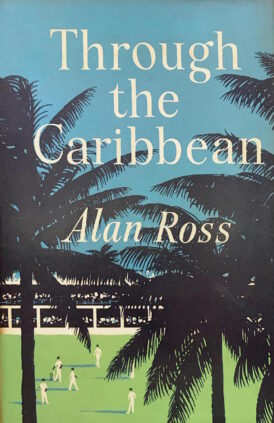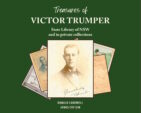Through the Caribbean
Archie Mac |Published: 1960
Pages: 296
Author: Ross, Alan
Publisher: Hamish Hamilton
Rating: 4.5 stars

Author Alan Ross is much loved by all the reviewers on Cricket Web, and in fact by pretty much all cricket bibliophiles. See Martin’s quality short biographical piece on Ross.
Through the Caribbean is really two books in one; part cricket and part travel/historical book. In his preface, Ross invites anyone only interested in the cricket to skip the rest. I can wholeheartedly urge people not to do this, as it will greatly reduce your enjoyment.
Reading Ross’ description of cricket in the West Indies in 1960 reminds one of current day India. The Windies were cricket mad, and Ross’ tells us that there was a pickup game on almost every available piece of real estate. Perhaps it was this change of mindset and not the lack of money that has caused cricket to lose its pre-eminence in the Caribbean.
The cricket of 1960 was a different game. No helmets, no roped off boundaries, no match referee, no limited overs games, and no facility to make up for lost time. What the cricket of 1960 shares with modern times are the controversies. Ross was not impressed with the slow over rates by both teams, and particularly the short pitched bowling. Ross thought this was overdone especially by the West Indian pair of Wes Hall and Chester Watson. Ross quotes some writing of political activist C.L.R. James who dismisses concerns about short pitched bowling by the West Indies, indicating that “Test cricket is not for children”. Three years later James would author what many consider to be the greatest cricket book – Beyond a Boundary.
The most controversial moment of the series was the riot during the second Test, after a run out went against one of the West Indian batsmen. Ross again makes it clear that he was not overly impressed by the agitating writing of James, who advocated for the replacement of the West Indies white captain Gerry Alexander by Frank Worrell. I had the impression that Ross thought James’ comments may have added to the riot, although that may be just my interpretation.
The series itself was an attritional battle with batsmen friendly pitches and defensively set fields. In the end England won the five Test series one – nil, with only the second Test ending in a result. Despite four draws, Ross still enjoyed the series as both teams often had their chances with the result in doubt until the last day. At the time Tests were played over six days, with five hours play per day – so the same amount of hours as modern five day Tests.
England’s win was contributed to by their luck with the toss, winning all five for the first time since 1905. The England captain was Peter May, who seemed out of sorts with the bat throughout the first three Tests. It turns out that May, before leaving England, had hadan operation for an abscess. The abscess started to bleed early in the tour, which May decided to keep from the manager and most of the team. He was afraid he would be sent home, which was exactly what happened once he came clean. Colin Cowdrey took over the hegemony role for the last two Tests.
The whole trip sounds like a great adventure for Ross, who was obviously close to the team, regularly attending parties with the players. Ross was also pressed into action as a net bowler. It’s not clear what Ross bowled but it can’t have been too bad as he writes that he bowled most afternoons to those not playing in the first Colony match at Port-of-Spain. After his net bowling stint he would go for a swim in the Governor-General’s pool. I can almost see him diving into that pool after a hot net session bowling to Colin Cowdrey and Co.
Ross’ social life didn’t just revolve around the cricket, for example he spent almost a week in Jamaica with Ian Fleming. While the great author was not always available as he was writing a James Bond book, Ross’ time there sounds idyllic. The book Fleming was almost certainly writing was Thunderball, which was released in March of 1961.
I have read plenty of tour books, but there are not many that can match the quality of writing that Ross displays in Through the Caribbean. He fully deserves his status as one of the best, if not the best cricket tour book author.






Surely they were only five day tests? I think you counted the rest day.
Comment by Jim | 9:22am GMT 27 November 2023
No, they were 6-day Tests; Tests in the West Indies were in the 1950s and most of the 1960s (by 1968 they’d switched to 5-day Tests).
Comment by AndrewB | 12:09am GMT 28 November 2023